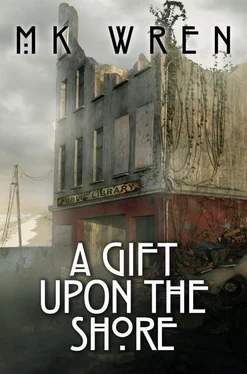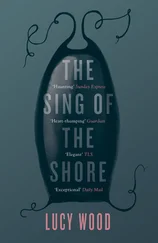Then comes the multiplication, and while the others watch, Jonathan makes the calculations on the blackboard and finally reveals that to count to one million would require nearly ten and a half days. They are all satisfactorily amazed and, I hope, have learned a little about calculation as well as measuring time.
And million is a concept vital to these children. Their world is as small and flat as the world of their ancient ancestors. It took more than thirty millennia for humankind to discover million and the even larger numbers it spawned, and they gave us the measure of the universe.
That measure must not be lost.
By the time the midday meal is finished, cumulus clouds are marching in over the horizon, but they offer no real threat of rain. I find Stephen waiting for me on the deck, and once I’ve settled into my chair, he wastes no time on small talk. “Did you bring one of your diaries, Mary?”
His impatience pleases me. I reach into my skirt pocket for a diary—the third one—but again, it’s only a prop and a prod to memory. “Of course I did. Now, where was I?”
He turns in his chair, his hooded eyes intent. “You were telling me about Armageddon here at Amarna.”
I open the diary, study the erratic notations, and it requires a stringent mental bracing to return in memory to that time. It reminds me that spring days spent in quiet, satisfying endeavors are the obverse of dark days spent in terror, and the coin can flip so quickly, so casually. “Yes, when Rachel and I retreated into our cave.”
“Your cave?”
“The basement. But it seemed like a cave to me. I felt like… like time had folded in on itself, and I was a Cro-Magnon woman huddled at the hearth in my cave, with the glacier wind and the Dire Wolves howling outside, and tens of thousands of years had been lost as if they’d never existed.”
His eyes narrow thoughtfully, then he asks, “But why did you have to stay in the basement?”
“Because of the radiation from the bombs. FEMA—that was the Federal Emergency Management Agency—had published volumes on surviving a nuclear war. Surviving! They estimated it would take two weeks for the initial fallout to clear. So, Rachel and I stayed in our cave for two weeks without once even opening a window. We didn’t know how bad the radiation was here. Actually, I don’t think we got much initial fallout. That storm protected us. But we didn’t know. Jim had a Geiger counter, but we didn’t find it in the shelter or in their house, so we didn’t know about the radiation. We didn’t know anything . That was the worst part. We didn’t know whether Jim’s radio just wasn’t working or couldn’t pick up anything through the basement walls or whether there was no one out there broadcasting. The only thing we did know is that it was colder than usual for September. We just huddled there in our frigid cave for two endless weeks—wondering.”
I pause, look up into the cloud-dappled, springtime sky. “The odd thing is, Stephen, that was a time of hope. I mean, a time when it was still possible to hope. I imagined the worst, yes, but sometimes I imagined the best, which was that we’d made a mistake, that there hadn’t really been a war. Or I imagined that even if there had been a war, it wasn’t extensive enough to destroy all civilization. And I imagined that when we left our cave, we’d find other survivors, pool our resources, and work ourselves out of the disaster. I imagined we’d find at least vestiges of a government to help us. Of course, I realized it might not be ours. We might have lost the war.” I have to laugh as I speak those words. You can’t say that without either laughing or crying.
Then I look around at Stephen. “But the two weeks finally ended. Rachel and I finally came out of our cave.”
His obsidian eyes are fixed on me; he seems to have stopped breathing. “What did you find?”
“Nothing that I had imagined.”
I close the diary. I need no prod for memory now. Sometimes I wish I could forget.
See, Winter comes to rule the varied year,
Sullen and sad….
Welcome, kindred gloom!
Congenial horrors, hail!…
Cruel as death, and hungry as the grave.
—JAMES THOMSON,
THE SEASONS. WINTER (1726)

While the dogs barked insistently, Rachel stood on the landing at the top of the basement stairs, her hand on the doorknob, but she paused there, and Mary waited impatiently, pulse hammering. When Rachel at length opened the door, the dogs spilled out, claws scrabbling on the oak floor. But there in the chill, dim silence, their barking ceased, and Mary looked around the house with the daunting sense that she’d never been here before. She noted the open cabinet doors in the kitchen, the disarray left in their hurried evacuation. Only two weeks ago? It seemed like something remembered from her childhood.
She made her way into the living room. The drapes were closed. There was an emptiness under her ribs, and she wondered whether to call it hope or fear. She turned, saw Rachel behind her, then pushed the drapes aside and opened the sliding door. A rush of wind billowed the cloth as she went out onto the deck and into the outside world she’d been waiting so long to see.
September. She had to remind herself that this was September. Indian summer.
The wind, thick with stinging snow, pummeled her, the cold like a knife blade at the back of her neck. The deck was an untracked plane of snow, the lawn a rippled dune of snow, the beach, except for the dark band cleared by the waves, a swath of white and gray, snow and ice.
She had to remind herself that this was morning. Her mind balked at that as it did at Indian summer. Her mind recognized this somber light as winter dusk. The horizon was obliterated by sullen clouds and a fog of snow, and she could see only a few hundred feet past the breakers, where the northeast wind blew fans of riffles against the shoreward surge. And the sea was steaming. Whirlwinds of vapor rose from the roiling surface, danced ahead of the wind.
“Rachel…” The wind whipped the word away into the snow.
Rachel stood beside her, staring out at the sea, eyes shadowed with dread. “I’ve seen snow here. Only three times in twenty years, and only in December or January.” She looked up at the oppressive clouds. “But I’ve never seen it so dark. I’ve never seen that color….”
Mary saw the odd brazen cast of the clouds. Two words came unbid and clear into her mind. She didn’t say them aloud, although she saw Rachel’s lips move as if to form them.
Nuclear winter .
The implications in those words were stunning. They numbed her mind as the cold numbed her body. She said dully, “Rachel, we’ll have to go down to Shiloh and see if anyone there can tell us what happened or what’s going on now.”
“If anyone there knows.” She swept up a wad of snow from the railing with her gloved hand, then turned and crossed to the door. “Before we go anywhere, we have to find out if any of the animals survived.”
Mary started to protest the delay, but she couldn’t bring herself to argue with Rachel. Not now. They went to the garage first, where, in that hour of frantic preparation that seemed so long ago, they had pushed the van out and moved the chickens and rabbits in. The air was sour with the smell of droppings, and their entrance set the chickens flapping and squawking, while the rabbits scrambled for cover, eyes gleaming in the beam of Rachel’s flashlight. The living left in their wake scattered heaps of the dead.
For the living, the first problem was water; the water basins had frozen. Mary went into the house to fill a bucket at the kitchen sink, a task that took an inordinate length of time. The pipes hadn’t entirely frozen, but only a gurgling trickle flowed out of the faucet. And while she waited for the water to slowly, slowly fill the bucket, she thought of Shiloh. They had to get to Shiloh, had to find out what had happened and what was being done.
Читать дальше













